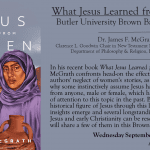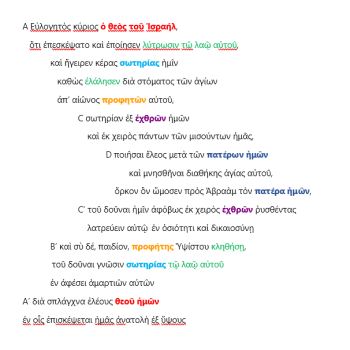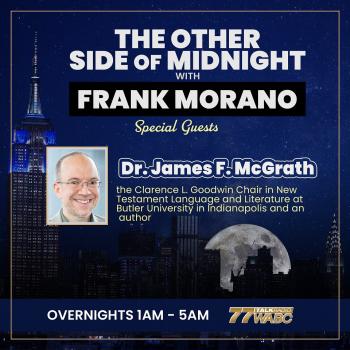Several points come together in this blog post, emerging from the journey of my Sunday school class through the Lord’s Prayer. The petition for forgiveness in this prayer that every Christian denomination utters stands at odds with how some individuals and groups understand the atonement and the significance of Jesus’ death. In short, if you think that forgiveness of sin is only available through the death of Jesus, then you must understand that line (“forgive us our sins/debts”) either as Jesus teaching his followers to pray something that was meaningless and ineffective at the time he taught it to them, or as “really” meaning something like “forgive us our sins by sending Jesus to the cross to die for us and make that possible.”
The problems with the view that Jesus’ death alone makes forgiveness possible run even deeper than that. It isn’t just the fact that the entire Jewish Bible (Christian Old Testament) is full of similar prayers as well as affirmations that God has mercifully forgiven, all of which become meaningless or even false within the framework of this theology.
Some theologies of atonement claim that God is unable to forgive apart from the cross.
Think about that for a moment. Those same Christians affirm divine omnipotence. They may have a bumper sticker that affirms that nothing is impossible with God. They may insist that God can make a square circle.
But forgive simply by showing mercy, forgive by just forgiving? Sorry, no, they will tell you, God’s hands are tied.
That isn’t what the Lord’s Prayer says. It doesn’t call upon us to pray “Send Jesus to pay our debt, as we forgive our debtors.”
There is so much more wrong with this view of the atonement, often categorized under the label of the Penal Substitution Theory of atonement. It shifts the idea of sin away from images of broken relationship and reconciliation to a matter of accounting. It then posits God “cooking the books” to resolve the debt we cannot pay.
We must add to the list of problems with this view the fact that the language of Jesus paying our debt is not biblical.
But the biggest issue is that ultimately this view makes God the problem when it comes to forgiveness of sin. We’d like to be better, but we have a sinful nature and so can’t be. We long for forgiveness and reconciliation, supposedly, but apart from the cross God’s hands are tied. Do you see how this view subtly shifts blame away from us? If God can forgive and is eager for human beings to be reconciled to God, then the problem is squarely on our end. We claim to want reconciliation but we actually prefer to carry on living as we choose and trusting that this just adds to our sin debt account which Jesus has paid in full. Penal Substitution substitutes impersonal transactional images for reconciliation, which requires genuine repentance and transformation.
There is a famous sermon with the title “Sinners in the Hands of an Angry God.” The Penal Substitution Theory of Atonement is what happens when you put God in the hands of angry sinners.
But another way of viewing things is possible, and we find it expressed in (among other places) the Lord’s Prayer…
Of related interest, I was invited to be the first guest on a new Freethinkers Podcast and spoke about the topic of this blog post (and indeed, mentioned my need to finish it!)
https://www.youtube.com/watch?v=icCUCZ3A7zI
I will also need to take up and explore the idea that Jesus and before him John the Baptist were “pirates of forgiveness” which Richard Beck expressed on his blog recently. I like the idea that John the Baptist’s rite offered an alternative to sacrifice, which was prohibitively costly for the poor.
Richard Beck also talks about theories of atonement and related metaphysics in a blog series titled The Disenchantment of Salvation. Here are part 1, part 2, part 3, part 4.
Elsewhere on my own blog, John Macdonald asked a question about 2 Corinthians 5 and penal substitution, to which I responded as follows:
I will have another blog post on atonement and related matters soon. In the meantime, very briefly, I think that the broader context of 2 Corinthians 5 and other specific statements are clearer and articulate a view that is not penal substitution, while the words you quote are ambiguous and likely mean something else. On the one hand, “made sin” does not necessarily mean “made to bear sin” and the whole statement could be understood in terms of participation and exchange – he became what we are that we might be made like him, he got entangled in this world of sin to disentangle us from this world of sin, and so on. Meanwhile elsewhere in the immediate context we find the following: “God was reconciling the world to himself in Christ, not counting people’s sins against them.” That makes restoration of relationship the focus, and depicts God as simply forgiving rather than requiring substitution or other satisfaction. Most decisive, in my opinion, is the other statement in this immediate context, “one died for all, and therefore all died…” It is not that one died because all should have and thus substituted in their place. Rather, the one dying means that all who are in Christ die as well to the present evil age, and begin to share in the new life of the age to come. The image is of a “second exodus” not from bondage in a particular place in the world, but from the bondage to sin and death that characterizes the present age as a whole.
Steve Caruso drew my attention to Aramaic resonances in the Gospels that I hadn’t noticed before, which connect some of the texts I talk about here and/or explored in the Sunday school class that prompted this post.
Also of related interest:
Mike Bird mentioned Philemon and justification by grace. I’m not sure the point works. What do you think?
https://solacrux.wordpress.com/2021/04/26/pluriformity-of-atonement-views-part-i/
Bob Cornwall blogged about salvation
Who Will Be Saved? – The Question That Divides Evangelicals from Mainline Protestants













